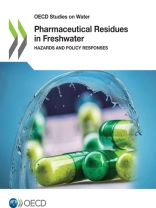This report calls for a better understanding of the effects of pharmaceutical residues in the environment, greater international collaboration and accountability distribution, and policy actions to prevent and remedy emerging concerns. Laboratory and field tests show traces of oral contraceptives causing the feminisation of fish and amphibians, and residues of psychiatric drugs altering fish behaviour. Antimicrobial resistance, linked to the overuse of antibiotics, has rapidly escalated into a global health crisis. Unless adequate measures are taken to manage the risks, pharmaceutical residues will increasingly be released into the environment as ageing populations, advances in healthcare, and intensification of meat and fish production spur the demand for pharmaceuticals worldwide. The report outlines a collective, life?cycle approach to managing pharmaceuticals in the environment. A policy mix of source?directed, use?orientated and end?of?pipe measures, involving several policy sectors, can help to improve health and protect the environment.
Organisation for Economic Co-Operation and Development (OECD)
Pharmaceutical Residues in Freshwater: Hazards and Policy Responses [PDF ebook]
Pharmaceutical Residues in Freshwater: Hazards and Policy Responses [PDF ebook]
Cumpărați această carte electronică și primiți încă 1 GRATUIT!
Limba Engleză ● Format PDF ● ISBN 9781789061826 ● Editura IWA Publishing ● Publicat 2020 ● Descărcabil 3 ori ● Valută EUR ● ID 8196565 ● Protecție împotriva copiilor Adobe DRM
Necesită un cititor de ebook capabil de DRM












